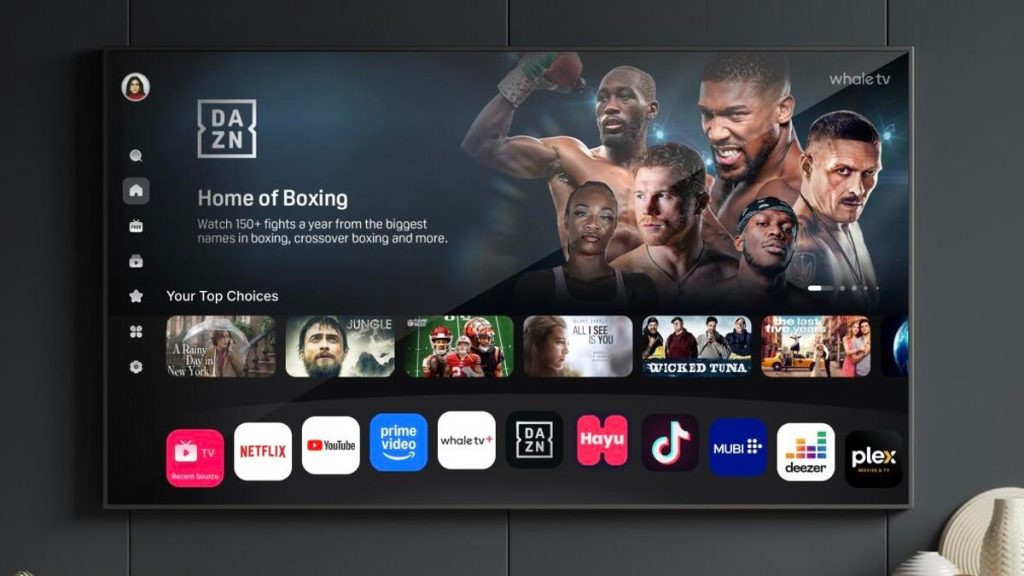Whale TV, a Singapore-based operating system developer formerly known as Zeasn, is launching a significant upgrade to its smart TV operating system, Whale OS. This new iteration, Whale OS 10, is poised to transform the smart TV experience with the integration of artificial intelligence, promising a more intuitive and personalized user journey. The update is initially rolling out to Whale TV’s extensive network of partners, which includes over 400 brands such as Philips, JVC, and Telefunken, strengthening their position in the increasingly competitive smart TV OS market. While US availability remains unconfirmed, the global reach of Whale TV, powering over 43 million active smart TVs worldwide, underscores the potential impact of this update.
Whale OS 10 introduces a suite of features designed to enhance user interaction and content discovery. Central to this is the integration of a ChatGPT-powered voice assistant, enabling users to control their TVs and access content through natural language commands. This conversational interface aims to simplify navigation and create a more seamless experience. Furthermore, the inclusion of user profiles and AI-driven recommendations personalizes the viewing experience, tailoring content suggestions to individual preferences. This allows for a more curated and relevant selection of shows, movies, and other entertainment options, effectively addressing the challenge of navigating the overwhelming abundance of content available on modern smart TVs.
The strategic shift from Zeasn to Whale TV reflects the company’s ambition to build direct consumer recognition. Previously focused on partnerships with TV manufacturers and factories, the rebranding signifies a move towards establishing a distinct consumer-facing identity. This transition is further reinforced by the launch of Whale TV Plus, a free, ad-supported streaming service available on all Whale TV devices. This integrated service, which merges the company’s existing rlaxx TV and Whale Live platforms, provides users with a streamlined access point for free streaming content without requiring additional subscriptions or logins. By offering a comprehensive and user-friendly entertainment ecosystem, Whale TV aims to solidify its presence in the smart TV market and directly engage with consumers.
The introduction of Whale OS 10 and Whale TV Plus positions Whale TV to compete more directly with established players in the smart TV OS arena, such as Roku and Fire TV. These platforms have set a high bar for user experience and content accessibility, and Whale TV’s latest offerings aim to match and even surpass these standards. The combination of AI-powered features, personalized recommendations, and a free integrated streaming service offers a compelling value proposition for consumers. This integrated approach, combining the operating system with a curated content offering, could prove to be a key differentiator in the increasingly crowded smart TV landscape.
The successful deployment of Whale OS 10 and the adoption of Whale TV Plus will be crucial for Whale TV’s continued growth and market penetration. The company’s established partnerships with major TV brands provide a strong foundation for distribution, ensuring that the updated OS reaches a significant audience. The challenge lies in effectively communicating the value proposition of these new features to consumers and enticing them to embrace the Whale TV ecosystem. The focus on user-friendliness, personalized experiences, and free content access will likely be key factors in driving adoption and establishing Whale TV as a major force in the smart TV market.
In conclusion, Whale TV’s latest moves represent a significant evolution in its strategy, shifting from a behind-the-scenes OS provider to a more consumer-centric brand. Whale OS 10, with its AI-powered features and personalized recommendations, combined with the free streaming service Whale TV Plus, positions the company to compete directly with industry giants. The success of this strategy will hinge on consumer adoption and the ability to deliver on the promise of a seamless and personalized entertainment experience. The coming months will be critical in determining whether Whale TV can carve out a significant share of the increasingly competitive smart TV market.

